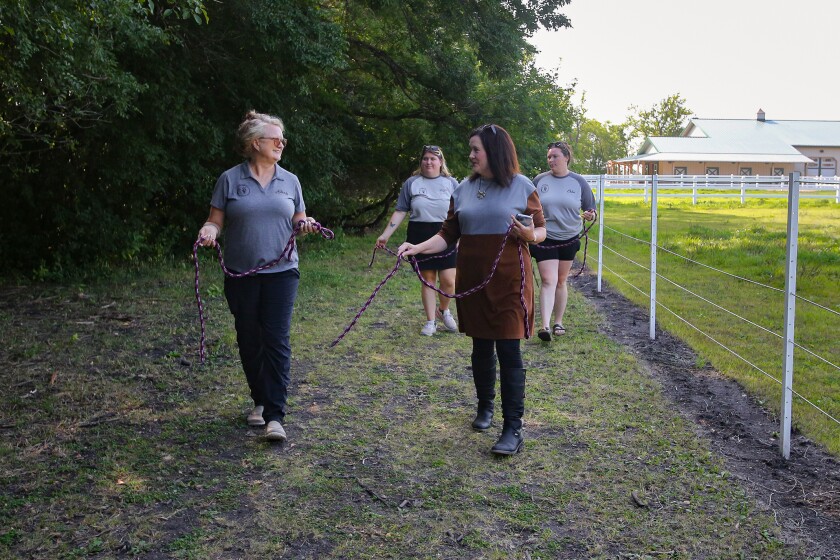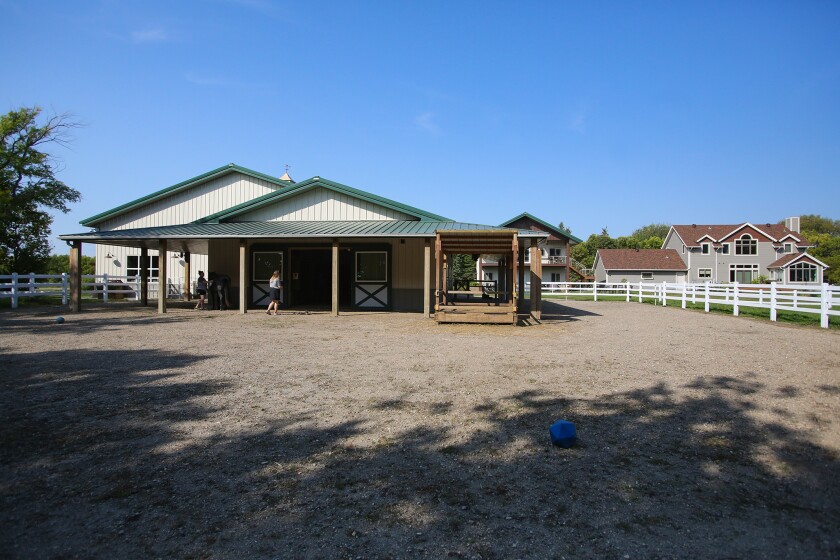
GLYNDON, Minnesota — On a warm, fall day at That’s the Dream Farm, a barn cat stretches out lazily on the grounds while goats bleat nearby, paused momentarily from their job of clearing the matted brush at the back of their pen.
An especially keen visitor might also spot the chickens in their coop pecking at the ground, or the farm hand’s dog eyeing them suspiciously. All will eventually confront the central characters of the place: Raff, Teddy, Cricket and Rosie.
Standing alert in their stalls, the horses quietly poke their heads out, eyeing guests with a gentle, curious gaze. They are work horses, but not in the way one might think. Rather than their strong, muscular exterior capabilities, it’s their interior strengths that are most appreciated here.
“I had horses growing up, and I knew what they did for me,” said Dawn Robson, whose dream of giving back to the community brought the farm to reality. “We work with people overcoming fears a lot.”

It’s the start of a story that begins when she was nine, growing up on a farm near Carrington, North Dakota, and learning that a friend, a 23-year-old hired helper, had been brutally murdered.
“He would have been a person society would have looked down on,” Robson said, noting that Bob had had a hard life growing up in an abusive family and lacked an education. “But he was like a brother to me.”
At the funeral, noticing she was the only one with tears streaming down her cheeks, Robson shut down. “I quit crying for many years,” she said.
Though no one seemed to understand the depths of her emotions, her horses somehow did. In time, healing came, and eventually, so did resources that allowed Robson to bring her “empty nest project” to fruition.
“A lot of this, I would say, is because of Bob — that wanting to see the value in every person,” she explained. “Your value is not defined by what you do, but because you are a child of God.”

As an example, she formerly worked as a nurse for cardiovascular surgeons, who were well-respected. “Bob deserves the same respect as they do,” she said.
Despite its short time in existence — That’s the Dream Farm hosted an open house at its current location in 2022 — the ministry is finding its way into the hearts of many, such as veterans with post-traumatic stress disorder (PTSD), new-American teens carrying the grief of a history of war, first responders, or the homeless who’ve often lived with trauma-induced mental illnesses and lack of healthy connections.
Christian Klonowski, the farm manager, connected with Robson in 2020 after most of the construction had been finished.
“The old barn on the property had to be torn down; it wasn’t stable,” Klonowski said, noting that it had been owned by a local family for 80-plus years. Keeping the foundation, they erected a new building, including a stable for the horses to roam.
Due to some negative experiences growing up, Klonowski said, initially he wanted nothing to do with the horses.
“I wouldn’t touch them or go near them,” he said.
But he’s overcome that now, thanks to the National Lifemanship educational program that undergirds their work, teaching through a “trauma-informed lens.”
“Most of the work we do is equine-assisted learning, which has a direct relationship component with the horses,” he said. “I was able to work with Dawn and build a different skill set. I needed to work through my own fear in order to have a healthy relationship with the animals.”
That’s the Dream Farm works with groups and individuals, relying on the horses to guide the clients, staying mindful of the free will of both. “If I’m working with a horse, and it’s just me and the horse, I’ll make requests to direct their attention to me,” Klonowski explained. “Based on how they respond, I have a series of actions I can do.”

Together, the horse and human develop a relationship through a method that contrasts the typical “power and control” type often seen in horse training.
“Here, they’re not just there for riding or to look pretty, but to help us develop relationships and learn relational skills,” Robson said, which carries over into human relationships.
Billy Barnett, program director of the New Life Center in Fargo, previously managed the Genesis recovery program for the center, and connected with Robson about what the farm might offer the homeless men with whom he works.
“A lot of the men we were trying to help needed help with more than addiction,” he said, noting that anxiety, trauma from childhood and various effects from difficult experiences were cropping up often.
After meeting Robson about three years ago, Barnett was hopeful, but concerned about compensation, since many of the men don’t have health insurance. Robson assured him they would find a way, and they started bringing groups to the farm a couple times a month.
“Every summer, she shuts everything down and does a weekend of therapeutic retreat,” he said. “It’s a big deal, with all of them out there camping in tents, with process groups addressing their trauma, and using exercise movements to overcome PTSD. It’s been an incredible blessing to us.”
Much of the work centers on relationship-building, he added, “like, just having fun, getting the guys to shoot hoops and play games or be silly. Many haven’t felt safe to do that for quite some time.”
Usually the men are in a clinical setting when seeking healthcare, Barnett noted, seeing a suit and a clipboard. “Dawn is good about making it very human to them,” he said.

The horses pick up on the energy of the visitors. “It’s very much about engaging with how you feel while the horse is near you,” he explained. Often, in simply interacting with and petting the animals, feelings that have been shut down for years can be safely opened up.
“People don’t normally invite these men to their farms,” Barnett said. “They’ve got records and they’ve been homeless. So to be invited means a lot to them.”
He noted marked improvement in the confidence and self-esteem of many. “Some of what they carry is, ‘I’m not wanted. I’m not going to fit in with others,’” he said. “But (at the farm), they are met with love, hospitality and welcoming.”
Also a certified life coach, Robson offered a way for the men to name and address wounds from childhood. “Just the awareness for the men of where some of those wounds have started and working towards forgiveness — that’s been huge for them, to feel a sense of release and letting go of some of that pain.”
Unlike some other programs, Barnett said, Robson and her That’s The Dream Farm isn’t out to make money.

“She’s going out of her way to help those who wouldn’t get that help otherwise,” he said. “There’s something very organic and special about what she’s doing, and the men I help here at the shelter, they feel it. It stands out.”
For Robson, it all comes back to faith, which she says is foundational. “We all have some pretty significant traumas, but when you work through them, you’re better able to help others,” she said, like in the Bible, when Christ restored Peter, and then said, “Now turn around and help your neighbor.”
“To stand in that place where you can help someone develop a safe place is such an honor,” Robson added.
To learn more about this ministry, visit https://www.thatsthedream.farm/ .
[For the sake of having a repository for my newspaper columns and articles, I reprint them here, with permission, a week after their run date. The preceding ran in The Forum newspaper on Sept. 22, 2024.]

Leave a Reply